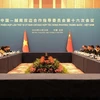The Meeting of Women Parliamentarians of the ASEAN Inter-Parliamentary Assembly (WAIPA) took place in Hanoi on September 20, drawing the participation of 28 women parliamentarians from nine AIPA member delegations.
Under the chair of Vietnamese NA Vice Chairwoman Tong Thi Phong, AIPA female parliamentarians discussed draft resolutions on improving social welfare and development for women and children, the role of women in economic recovery after the financial crisis, women’s participation in the political field as well as the role of female parliamentarians in law making.
Regarding the draft resolution on strengthening social welfare and development for women and children, the delegates paid attention to ensuring education and health care for women and children, care services for children, and employment opportunities and vocational training for women, especially poor and immigrant women.
The women parliamentarians agreed to call on AIPA member countries to continue financial support for supervising the implementation of national policies and regional agreements on social welfare and development for women and children.
They also recommended that AIPA member countries strengthen cooperation, information and consultation in formulating and enforcing laws and policies relating to social welfare and development for women and children.
The meeting applauded results reached during the 16 th ASEAN Summit in Hanoi on April 2010 on sustainable economic recovery measures and guidance on the building of economic development models after the global financial crisis.
The meeting also agreed on the contents of the draft resolution on the role of women in economic recovery after the financial crisis, which affirms the important role of women in economic development and building the ASEAN Community, as well as hastening AIPA member countries to approve policies and programmes supporting female workers and entrepreneurs.
The AIPA women parliamentarians also voiced their support for the draft resolution on increasing women’s participation in the political field, which has been built on the basis of existing AIPA resolutions on strengthening the role and participation of women in political activities.
The delegates agreed to not set any specific target number of women parliamentarians for ASEAN countries, as each country has its own political regime and socio-cultural conditions. Instead, they urged more efforts to increase the number of women parliamentarians in each country in the future.
Regarding the draft resolution on the role of women parliamentarians in law making, the delegates agreed with the report and proposals of a Vietnam-initiated meeting on the role of women parliamentarians in the process of law making held in Hanoi from November 29 to December 3, 2009.
Speaking at the closing ceremony of the meeting, NA Vice Chairwomen Phong, who is also head of the Vietnamese NA delegation, said that social consensus is needed to increase women’s participation polictics.
After the 31 st General Assembly, AIPA should have more specific activities to put forward recommendations on policies that create more favourable conditions for women, she concluded./.
Under the chair of Vietnamese NA Vice Chairwoman Tong Thi Phong, AIPA female parliamentarians discussed draft resolutions on improving social welfare and development for women and children, the role of women in economic recovery after the financial crisis, women’s participation in the political field as well as the role of female parliamentarians in law making.
Regarding the draft resolution on strengthening social welfare and development for women and children, the delegates paid attention to ensuring education and health care for women and children, care services for children, and employment opportunities and vocational training for women, especially poor and immigrant women.
The women parliamentarians agreed to call on AIPA member countries to continue financial support for supervising the implementation of national policies and regional agreements on social welfare and development for women and children.
They also recommended that AIPA member countries strengthen cooperation, information and consultation in formulating and enforcing laws and policies relating to social welfare and development for women and children.
The meeting applauded results reached during the 16 th ASEAN Summit in Hanoi on April 2010 on sustainable economic recovery measures and guidance on the building of economic development models after the global financial crisis.
The meeting also agreed on the contents of the draft resolution on the role of women in economic recovery after the financial crisis, which affirms the important role of women in economic development and building the ASEAN Community, as well as hastening AIPA member countries to approve policies and programmes supporting female workers and entrepreneurs.
The AIPA women parliamentarians also voiced their support for the draft resolution on increasing women’s participation in the political field, which has been built on the basis of existing AIPA resolutions on strengthening the role and participation of women in political activities.
The delegates agreed to not set any specific target number of women parliamentarians for ASEAN countries, as each country has its own political regime and socio-cultural conditions. Instead, they urged more efforts to increase the number of women parliamentarians in each country in the future.
Regarding the draft resolution on the role of women parliamentarians in law making, the delegates agreed with the report and proposals of a Vietnam-initiated meeting on the role of women parliamentarians in the process of law making held in Hanoi from November 29 to December 3, 2009.
Speaking at the closing ceremony of the meeting, NA Vice Chairwomen Phong, who is also head of the Vietnamese NA delegation, said that social consensus is needed to increase women’s participation polictics.
After the 31 st General Assembly, AIPA should have more specific activities to put forward recommendations on policies that create more favourable conditions for women, she concluded./.



















